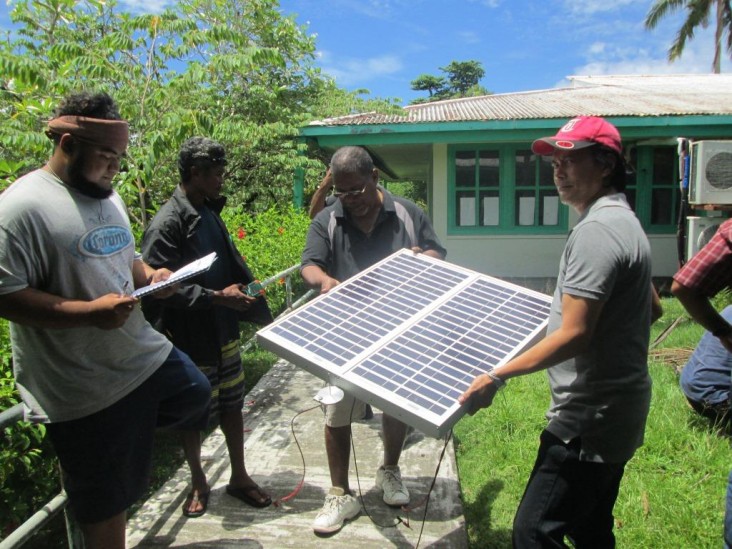
USAID has partnered with Arizona State University (ASU) under the Vocational Training and Education for Clean Energy (VOCTEC) program to build regional capacity of qualified technical trainers and technicians to install, operate, and troubleshoot off-grid solar photovoltaic (PV) systems in the Pacific Islands.
This program covers up to 12 Pacific Island nations. Eligible countries for training include: Federated States of Micronesia (FSM), Fiji, Kiribati, Republic of the Marshall Islands (RMI), Nauru, Palau, Papua New Guinea (PNG), Samoa, the Solomon Islands, Tonga, Tuvalu, and Vanuatu. These countries represent a broad range of populations and cultures, geographic sizes, and topological diversity within the region.
ACTIVITIES
VOCTEC’s Train-the-Trainer approach provides technicians a support system and ensures that local institutions are able to continue to educate and manage future operators and technicians within the region. VOCTEC’s capacity building activities incorporate gender and social issues in solar PV related technical training as well as entrepreneurship skills in its vocational courses.
In the Pacific, USAID is working with The University of the South Pacific (USP), a premier institution of higher learning uniquely placed in a region of extraordinary diversity. USP is jointly owned by the governments of 12 member countries. The University has set high standards in its research in a number of areas, including renewable energy. In addition to USP, VOCTEC has established partnerships with 10 other educational institutions across the region towards delivering solar training in the Pacific.
IMPACT
- Build capacity of partner institutions by providing curriculum,equipment and training manuals
- Train the trainers in solar photovoltaic energy systems
- Help the trainers train technicians
- Promote use of virtual training materials to support learning
- Create programs in new countries in the Pacific
- Trained 33 educators and 189 technicians from 11 institutions
- Established 11 training centers in the region
- Established partnerships with 11 educational institutions
- Provided 34 Mobile Training Toolkits to partner institutions
- Exceptionally high level of acceptance of gender inclusion by the trainees
- Significantly increased students’ technical skills
- Adapted virtual training materials to support learning
GOAL
To improve the sustainability of renewable energy infrastructure and investments in developing countries by increasing awareness, knowledge and capacity of local stakeholders, primarily in decentralized clean energy technologies
OBJECTIVES
Build capacity of partner institutions by providing curriculum, equipment and training manuals
- Train the trainers in solar photovoltaic energy systems
- Help the trainers train technicians
- Promote use of virtual training materials to support learning
- Create programs in new countries in the Pacific







Comment
Make a general inquiry or suggest an improvement.